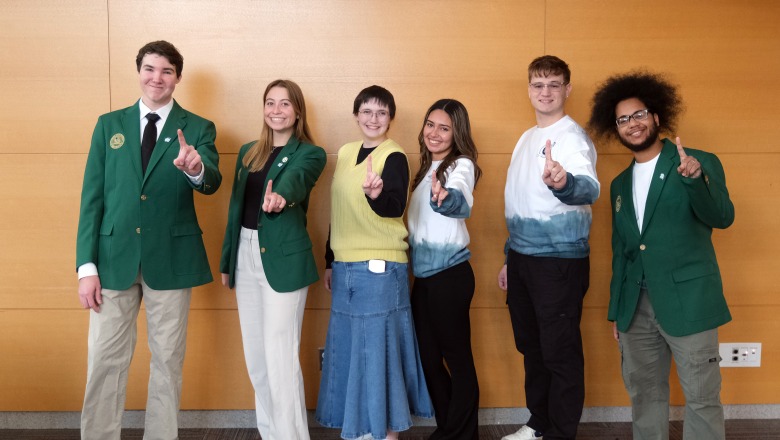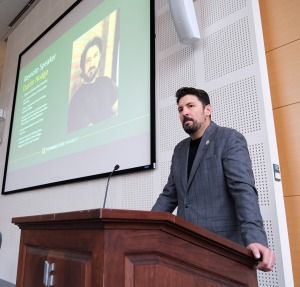This is a Fitchburg State University Alert: Due to inclement weather, the university will be closed Tuesday, Feb. 24, and both day and evening classes are canceled.
Campus Celebration of First-Generation Success
November 10, 2025
Fitchburg State University recently celebrated First Generation Day, highlighting the experiences of students who represent the first in their families to attend college. The keynote address was given by Dustin Hodge, husband of university President Donna Hodge, who described his long and nonlinear path to eventually graduating from Arizona State University.
“My parents didn’t go to college,” said Hodge, an Upward Bound alum when speaking to an audience featuring students in TRIO Student Support Services, Upward Bound and Upward Bound Math and Science in his address at Hammond Hall. “I did and it changed my life. That version is easy to tell — but it’s not the whole truth. Real first-generation stories are rarely simple. They’re messy, complicated and full of twists you don’t see coming. Mine certainly is.”
Hodge is a writer and documentary filmmaker who has produced more than 275 episodes of national television and led media projects in over 30 countries. His work, featured on PBS, the History Channel, CBS, and RFD-TV, highlights the stories of underserved and underrepresented communities. Additionally, he served as a producer for The Tight Rope podcast, hosted by Cornel West. Guests on the podcast have included Killer Mike, Daveed Diggs, and Jane Fonda.
Hodge was the first in his family to attend college, but his journey wasn’t an easy four-year march to graduation.
“I struggled with life outside of class,” said Hodge. “I moved six times in one semester. But I didn’t ask for help. I was afraid that if people found out I was a first-gen student, they’d think I didn’t belong. So I struggled quietly, and no one noticed.”
Hodge said that the reason why he loves Fitchburg State is because it’s different here.
“Because here, people do notice,” said Hodge. “Professors, staff, coaches — even the president — they see you. They will check on you. So remember this, you are important. You matter. It’s OK not to know how things work. It’s OK to make mistakes. It’s OK to feel lost, or frustrated, or embarrassed. Those feelings are normal.
“The person you are when you first set foot on campus is not the same person who leaves four
years later,” he said. “You’ll be stronger, more confident, and you’ll have something powerful —momentum.”
Hodge said that he lost his momentum.
Like his parents, Hodge was working two or three jobs at a time. He went from taking five classes a semester to three, to one and then zero.
“My mom kept encouraging me to finish my half-completed degree,” said Hodge. “She wanted me to have a chance she never got. Finally, I relented and promised her I’d go back to college.”
Unfortunately, his mother passed away before he could return to school.
“Losing her changed everything,” said Hodge. “It reminded me how fragile life is — and how important it is to spend it doing something meaningful.”
Hodge said he felt like he missed his chance to go back to college, so he took a leap of faith into something completely new: storytelling. He got a job in television at the ground level, carrying tables, chairs, and coffee as a production assistant.
“I showed up with a smile,” said Hodge. “I learned and little by little, carrying things led to running a camera, which led to cinematography, directing and eventually producing.”
Still, without a degree, there was a limit to how far he could go.
“And just as importantly, I had made a promise that I hadn’t kept,” said Hodge.
So more than a decade later, he went back to college.
“I felt like it was too late, but it wasn’t,” said Hodge. “I finished my undergraduate degree. Then I went straight into grad school and finished a degree in writing. I used my education to enhance my job skills.”
Hodge’s message is simple: believe in yourself and achieve your goals and dreams.
“If you haven’t done so already, tell people you’re going to get your degree,” he said. “Say it out loud. Speak it into existence. Make a promise and keep it. Once you have momentum, no obstacle can stop you.”
Director of TRIO Student Support Services Elizabeth Swartz facilitated the event, and conducted a question and answer session with a panel composed of faculty, staff, and students.
The Fitchburg State first-generation students on the panel were: Leah Alker, Julia Arena, Justin Conner, Geybrell Liriano and Aidan Thompson.
Faculty and staff panelists included: Professor and Psychological Science Department Chair Laura Garofoli, Dean of Students Tim St. John, Academic Advisor in TRIO Alyssa Annese, and Associate Director of Financial Aid Andrea Johnston.
Panelists said that being the first in the family to attend college is an extraordinary achievement. It means setting an example for those who come after you. The journey is also inspiring because it shows that barriers aren't insurmountable.
“It’s a cool feeling, but it’s stressful,” said Conner, a senior interdisciplinary studies major. “There’s a lot of pressure on me because of it, but just knowing that I was able to do something that my family, not necessarily had the ability to do, I’m excited but it’s nerve wracking to also graduate.”
Arena, a Presidential Ambassador, clinical exercise and sports science major who also works three jobs on campus, discussed an experience where she had to navigate different expectations between home life and college life. Arena’s family used to live approximately 40 minutes from Fitchburg State, but moved to Florida last year.
“My home life prepared me for living on my own because I had a lot of responsibilities at home,” said Arena. “I think I was pretty well prepared for college, but I think what I wasn't prepared for and it’s especially true this year, was that feeling of, ‘Oh, now I’m really independent.’ There’s a difference between moving to college and living away from your family that a lot of people don’t necessarily experience. My best advice in handling something like this is to lean on all the resources we have at school. If you have something you need help in, we have a resource to help you.”
Faculty and staff had a message for each student embarking on the college journey.
“Figure out how to advocate for yourself,” said Garofoli. “You have to build that muscle to advocate for yourself.”
“Don’t be afraid to fail,” said Annese. “Try literally everything here.”
There are so many ways to do college, said St. John.
“The right way is your way,” said St. John. “No pathway to graduation is the same for everybody. Every path to graduation is the right path. Keep that end goal in mind.”
Johnston said that she would tell her high school self to not write off her local state university campus just because of its proximity to home.
“There’s value in a degree from a state university,” said Johnston. “I truly believe that Fitchburg State is the No. 1 state university and I think we’re doing really great things here.”
